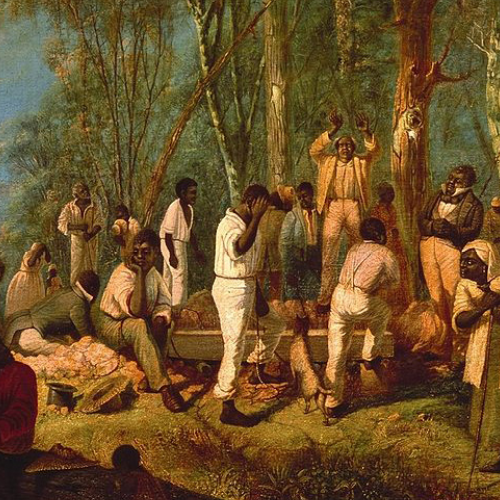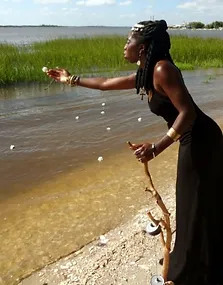
Queen Quet, Chieftess of the Gullah Geechee Nation
By Robin HarrisMarch is designated as Women’s History Month. It goes back to the early 1900’s, though had been erased until sometime in the 1960’s by an activist who called herself Laura X.
This month is set aside to highlight the contributions and legacies of women who have been forgotten or overlooked. This article will introduce a woman who has been a significant voice in environmental and climate justice work and advocacy: Marquetta L. Goodwine, also known as Queen Quet!
Queen Quet Marquetta L. Goodwine is a native of St. Helena Island, SC. She is a published author, computer scientist, lecturer, mathematician, historian, columnist, preservationist, environmental justice advocate, environmentalist, film consultant, and “The Art-ivist.” She is the founder of the premiere advocacy organization for the continuation of Gullah/Geechee culture, the Gullah/Geechee Sea Island Coalition. Queen Quet was selected, elected, and enstooled by her people to be the first Queen Mother, “head pun de bodee,” and official spokesperson for the Gullah/Geechee Nation. As a result, she is respectfully referred to as “Queen Quet, Chieftess and Head-of-State for the Gullah/Geechee Nation.”
Queen Quet has not only provided “histo-musical presentations” throughout the world but was also the first Gullah/Geechee person to speak on behalf of her people before the United Nations in Genevé, Switzerland. Queen Quet was one of the first of seven inductees in the Gullah/Geechee Nation Hall of Fame. She received the “Anointed Spirit Award” for her leadership and for being a visionary.
Queen Quet’s lineage is essential and worth mentioning to further spotlight not only her efforts, but the injustices of the environmental/climate crisis and gentrification. As noted above, Queen Quet is the offspring of the magical Gullah/Geechee people.

Gullah/Geechee descendants were enslaved Africans captured in Angola and other parts of the Western Seaboard of Africa who now stretch from Jacksonville, North Carolina to Jacksonville, Florida.
The first Gullah/Geechee people brought to the Carolinas were blacksmiths from Angola whose metal-working skills were in high demand. Their tools allowed the land to be cleared and turned into plantations that grew Carolina Gold rice, Sea Island cotton, and indigo. The enslaved Africans themselves were called ‘black gold.’ After the Civil War, the government confiscated the land and the Gullah/Geechee had to buy back the properties on which they were once enslaved.
Today, the Gullah/Geechee are working to protect Saint Helena from the coastal development that has overrun nearby islands like Hilton Head. In 1999, Beaufort County passed an ordinance that created a Cultural Protection Overlay (CPO) District. The ordinance preserves historical and archaeological sites and disallows gated communities, resorts, and golf courses on Saint Helena. It’s a fight that Queen Quet has and still champions!

Coastal development is a bit of a foreign concept to the Gullah/Geechee. Queen Quet explained that her African ancestors built their villages inland, as going to the water was an important part of their culture.
“Water for us is not about recreation. It’s about spirituality. We don’t see it as a place to play; we regard it as a sacred ground,” Queen Quet said. “So you don’t see us building a house right on the water, unless that’s the last piece of land a family has.”
Queen Quet has been and is committed to fighting this war against developers and the United States. She is aware of what is lost as coastal land is built up: “Others call it development. I call it deconstructionment,” she has said. “You just can’t have a Starbucks on the marsh.”
The Queen is involved in a different kind of development: rebuilding the oyster beds on Saint Helena through the South Carolina Oyster Restoration and Enhancement (SCORE) project. The Ace Basin Living Shoreline project seeks to reestablish the oyster beds that provide storm protection to Saint Helena, as well as fisheries. Through the project, oyster shells collected in biodegradable bags are placed along the shoreline to provide new habitat. Once a front line of oysters is established, the spartina grass can fill in behind it, recreating the maritime forest that once thrived.
Some people look at highly developed areas in coastal South Carolina and assume it is too late for communities to tune themselves to the limitations of natural systems—including a harsher future climate. Queen Quet said that in some places, ‘reclamation’ will mean taking buildings down. She sees an inherent impermanence in seemingly permanent structures. There is a proverb in the Gullah language that says: Da wata bring we. Da wata gwine tek we bak. So Queen Quet doesn’t agree with the ‘it’s too far gone’ attitude when it comes to coastal development.
“We have time right now to try to balance things as much as we can,” she has said.
Let’s Salute Queen Quet, Chieftess of the Nation of the Gullah People!
Robin Harris is an activist for Black, LGBTQIA, low-income, and other marginalized people. She is an organizer for Central Florida Mutual Aid and collaborates with GO Humanity service team Orlando Oasis on disaster recovery.
GO Humanity organizes poverty alleviation efforts around the globe with an emphasis on empowering vulnerable communities.
Photo: gullahgeecheenation.com
